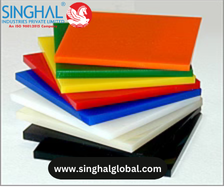Polypropylene (PP) sheets have emerged as a versatile solution in agricultural practices, particularly in the realm of mulching. As more farmers and growers seek sustainable and cost-effective methods to enhance crop yields and soil health, the use of PP sheets for mulching has gained significant traction. Let's delve into how these polypropylene plastic sheets are utilized and why they have become a preferred choice among agricultural communities worldwide.
Benefits of PP Sheets
PP sheets, manufactured by leading Polypropylene sheet suppliers, offer a plethora of benefits when used for agricultural mulching. One of the primary advantages is their ability to regulate soil temperature and moisture levels effectively. By placing PP sheets over the soil, farmers create a protective barrier that minimizes water evaporation and maintains optimal soil warmth, thereby promoting healthier plant growth.
Enhanced Crop Yield and Weed Control
The use of PP sheets for mulching contributes significantly to enhanced crop yields. By preventing weed growth and reducing competition for nutrients and water, these sheets help plants to thrive without the need for excessive herbicides. Farmers benefit from reduced labor costs and higher productivity per acre, making PP mulching sheets a cost-effective choice in modern agriculture.
Environmental Sustainability
In today's agricultural landscape, sustainability is paramount. PP sheets are known for their durability and recyclability, making them an environmentally friendly option for mulching. Unlike traditional plastic films, PP sheets can be reused for multiple growing seasons, minimizing waste and reducing the carbon footprint associated with agriculture.
Versatility and Ease of Installation
Polypropylene plastic sheets are available in various thicknesses and sizes, catering to different crop types and farming conditions. Their lightweight nature and flexibility make them easy to handle and install, even over irregular terrain. This versatility allows farmers to adapt mulching practices to specific crop needs, ensuring optimal results throughout the growing season.
Longevity and Resistance to Degradation
Manufactured by reputable PP sheet manufacturers, these products are designed to withstand the rigors of outdoor exposure. UV stabilizers incorporated into the sheets enhance their longevity by preventing degradation from sunlight exposure. This durability ensures that PP mulching sheets maintain their integrity throughout the growing season, providing consistent protection and benefits to crops.
Cost-Effectiveness and Return on Investment
Investing in PP sheets for agricultural mulching represents a sound financial decision for farmers. The initial cost is offset by savings in water usage, reduced labor for weed control, and increased crop yields. Over time, the return on investment becomes evident as farmers experience improved efficiency and profitability in their farming operations.
Case Studies and Real-World Applications
Numerous case studies highlight the effectiveness of PP sheets in agricultural mulching applications. From vineyards in Europe to maize fields in North America, farmers have reported substantial improvements in crop quality and yield after implementing PP mulching techniques. These real-world examples underscore the practical benefits and adaptability of polypropylene plastic sheets in diverse agricultural settings.
Innovations in PP Mulching Technology
As technology advances, so does the innovation surrounding PP mulching sheets. Manufacturers continue to refine their products, incorporating features that enhance biodegradability without compromising performance. This commitment to innovation ensures that PP sheets remain at the forefront of sustainable agriculture, meeting the evolving needs of farmers and environmental regulations alike.
Future Trends and Considerations
Looking ahead, the future of PP sheets in agricultural mulching appears promising. With increasing emphasis on sustainable farming practices and environmental stewardship, demand for Polypropylene plastic sheets is expected to grow. Collaborations between researchers, manufacturers, and agricultural communities will likely drive further advancements in PP mulching technology, paving the way for more efficient and eco-friendly farming methods globally.
Conclusion
In conclusion, the use of PP sheets for agricultural mulching applications represents a significant advancement in modern farming practices. From enhancing crop yields and weed control to promoting environmental sustainability, polypropylene plastic sheets offer multifaceted benefits to farmers worldwide. As technology and innovation continue to evolve, PP mulching sheets are poised to play an increasingly integral role in sustainable agriculture, supporting food security and economic viability for future generations.
FAQs
Can PP sheets be used with drip irrigation systems?
Yes, PP sheets are compatible with drip irrigation systems as they allow water penetration while minimizing evaporation and weed interference.
What thickness of PP sheet is ideal for agricultural mulching?
The ideal thickness depends on the specific application and desired longevity. Typically, thicknesses ranging from 0.5 to 1.5 millimeters are suitable for most agricultural mulching needs.
How can PP sheets be recycled after use?
PP sheets can be collected post-use, cleaned, and recycled into various plastic products or new PP sheets, contributing to a circular economy approach in agriculture.

Comments
Post a Comment